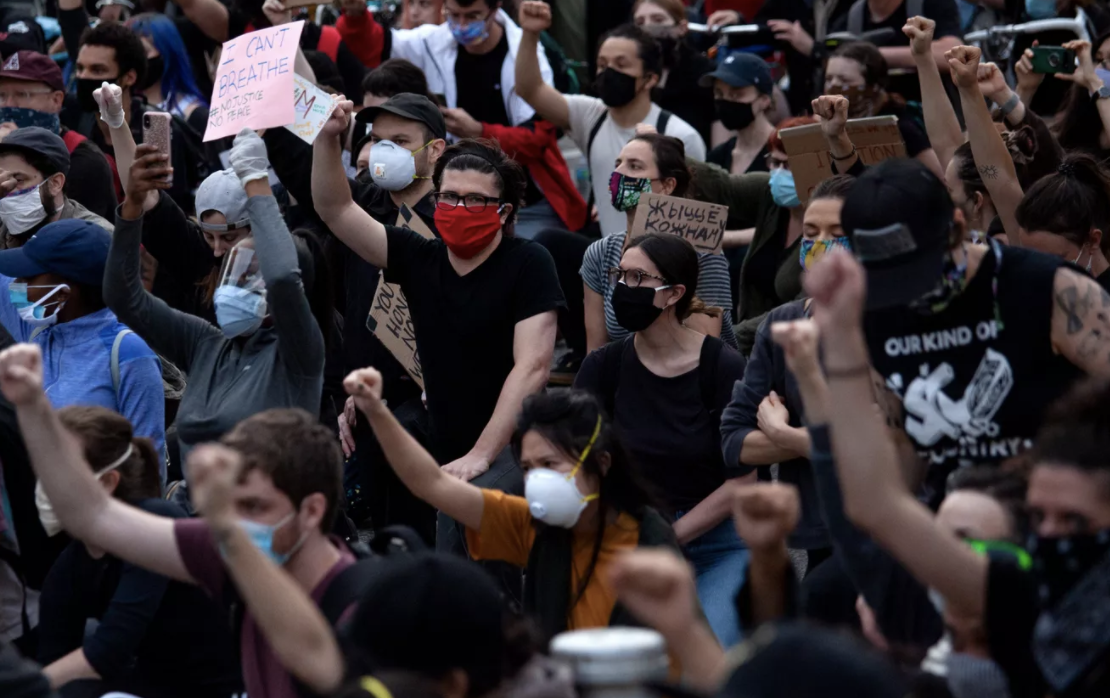NYC Mayor Orders Army Of COVID-19 Contact-Tracers Not To Ask About BLM Protests Attendance
Tyler Durden
Mon, 06/15/2020 – 16:50
As the debate about the importance of contact tracing rages on amid a spike in new cases and hospitalizations in certain states, the City reported last night that although NYC Mayor Bill de Blasio and NY Gov Andrew Cuomo have repeatedly warned about the risks of the anti-police brutality protests reigniting the coronavirus outbreak (so far, that doesn’t appear to be the case – at least, not in NYC), NYC’s army of contact tracers has been instructed not to ask subjects whether they attended the demonstrations.
That’s right: On orders from City Hall, de Blasio’s army of contact tracers – whose sole job is to figure where sick patients might have been infected, and whom they might have accidentally infected in turn infected – will be instructed to willfully ignore an obvious source of new infections in order to continue pandering to perpetually outraged leftists.
The hundreds of contact tracing workers hired by the city under de Blasio’s new “test and trace” campaign have been instructed not to ask anyone who’s tested positive for COVID-19 whether they recently attended a demonstration, City Hall confirmed to THE CITY.
“No person will be asked proactively if they attended a protest,” Avery Cohen, a spokesperson for de Blasio, wrote in an emailed response to questions by THE CITY.
Instead, test-and-trace workers ask COVID-positive individuals general questions to help them “recall ‘contacts’ and individuals they may have exposed,” Cohen said. Among the initial questions: “Do you live with anyone in your home?”
Tracers then ask about “close contacts” — defined as being within six feet of another person for at least 10 minutes.
Even as the WHO and many governments have held up contact tracing as an essential tool to prevent a resurgence, evidence shared by the WHO suggesting that ‘asymptomatic’ individuals rarely pass on the virus (since the main means of transfer is via the virus becoming ‘aerosolized’ via a cough or a sneeze’) suggests that it’s usefulness may be limited. Most of the time, newly infected patients go on to pass the virus to anyone with whom they live, which is why rural parts of the US where many more family members live together in the same house are seeing infections rates similar to densely populated cities.
Instead, officials are taking a different tack: Gov Cuomo has repeatedly urged all those who participated in the protests to get tested. Most likely haven’t yet, given the numbers who attended the demonstrations, and the statewide testing numbers, which amount to roughly 50k tests per day for the entire state.
Officials in Nassau County say that while they don’t specifically address the protests, they do ask interviewees for a detailed accounting of where they’ve been recently, which should cover protests (unless the person being interviewed opts not to divulge that information). Either way, there’s no way to be 100% certain.
Why are officials using such a light touch? Well, according to the City, some of those interviewed have treated the contact tracers with hostility or aggression. Although city hall says most of those interviewed have been cooperative. A professor at Columbia explained to the City’s readers that successful interviews depend on establishing trust, and inquiring about protests might be off-putting to some.
Dr. S. Patrick Kachur, a professor at Columbia University Mailman School of Public Health and a former official at the Centers for Disease Control and Prevention, said contact trackers face a balancing act: trying to obtain useful information about an infected person’s contacts without alienating them with overly intrusive questions.
Asking someone if they’d been at a protest could wind up discouraging them from being candid in their answers, he noted.
“I think the logic has to do with the fact that contact tracing requires a strong level of trust between the interviewer and the person they’re talking to,” he said. “It’s really important to have a good rapport and treat people with ease. It’s important to not ask questions that will impede your ability to do the best job you can.”
For example, Kachur, who has been involved in contact tracking during previous pandemics involving the flu and Zika, noted that when investigators are trying to track the spread of HIV, tuberculosis or most diseases, they make a point of not asking about a person’s immigration status.
Moreover, tracing the spread of the virus in such a densely packed moving crowd of strangers would be virtually impossible anyway.
And while knowledge of how the protests might be sparking a second wave would be helpful, it would be very difficult to track close contacts at events attended by thousands of strangers, he said.
“There’s definitely a concern that state and city officials have that the protests could be a place where transmission occurs, but that risk is lower than household and other community contacts,” Kachur said. “And it would be really challenging to trace those contacts who you’ve been protesting with.”
Just wait for President Trump to demand that local contact tracers be barred from asking about attendance at his upcoming rally in Tulsa.
The Far Left Fake News Media, which had no Covid problem with the Rioters & Looters destroying Democrat run cities, is trying to Covid Shame us on our big Rallies. Won’t work!
— Donald J. Trump (@realDonaldTrump) June 15, 2020
via ZeroHedge News https://ift.tt/2MZA86l Tyler Durden
